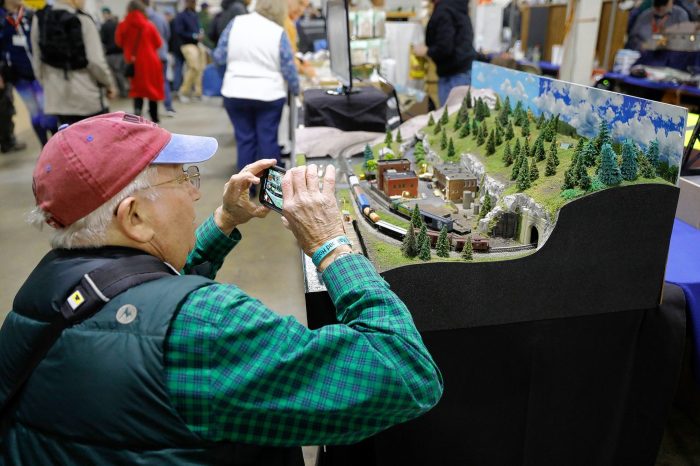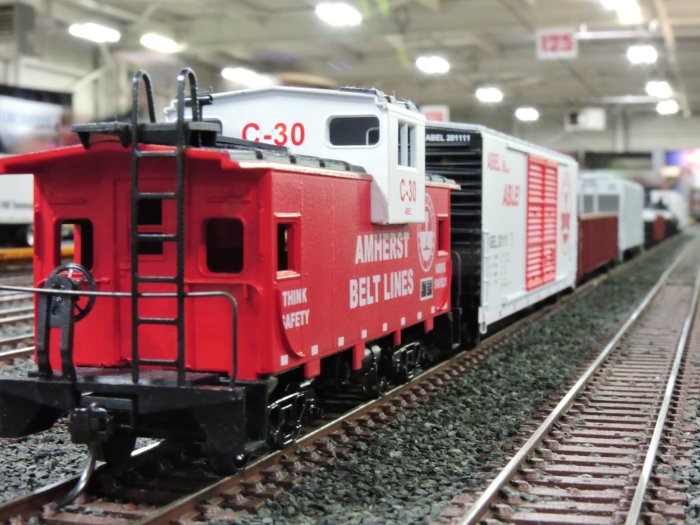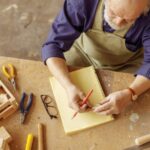Railroad Hobby Shows offer a captivating glimpse into a world of miniature marvels and passionate communities. From meticulously crafted locomotives to sprawling landscapes, these events showcase the artistry and dedication of model railroad enthusiasts. This exploration delves into the history, exhibits, vendors, and social fabric that define these unique gatherings, revealing the enduring appeal of this beloved hobby.
These shows aren’t just about trains; they’re a vibrant ecosystem. They bring together manufacturers showcasing the latest technology, hobbyists sharing their creations, and newcomers discovering a passion for meticulous detail and creative expression. The sheer variety – from meticulously detailed G-scale layouts to intricately designed N-scale dioramas – reflects the breadth and depth of the hobby itself. The evolution of these shows, mirroring advancements in technology and shifting demographics, provides a fascinating lens through which to examine the enduring appeal of model railroading.
Vendors and Marketplace at Railroad Hobby Shows

Railroad hobby shows represent a vibrant marketplace, bringing together a diverse range of vendors and enthusiasts. The sheer variety of products and services on offer, coupled with the direct interaction between buyers and sellers, contributes significantly to the overall atmosphere and success of these events. This marketplace fosters a unique community, allowing hobbyists to discover new products, connect with like-minded individuals, and expand their collections.
Types of Vendors Present at Railroad Hobby Shows
The vendor landscape at a typical railroad hobby show is remarkably diverse. Attendees can expect to encounter a mix of established manufacturers, smaller independent retailers, individual hobbyists selling off surplus items, and even artisans crafting unique model railroading accessories. Large manufacturers often showcase their latest product lines, while smaller vendors may specialize in niche items or offer personalized services.
The interplay between these different types of vendors creates a dynamic and engaging shopping experience.
Products and Services Offered by Vendors
Vendors at railroad hobby shows provide a comprehensive range of goods and services catering to all aspects of model railroading. This includes:
- Model Trains and Rolling Stock: Locomotives, passenger cars, freight cars, and other rolling stock in various scales and gauges (e.g., HO, N, O, G scale).
- Track and Accessories: Track sections, turnouts, switches, scenery materials, buildings, figures, and other accessories to enhance the model railroad layout.
- Tools and Supplies: Tools for building and maintaining model railroads, including paints, glues, weathering powders, and other essential supplies.
- Books and Magazines: Publications related to model railroading, providing inspiration, instruction, and historical context.
- Custom-Built Models and Kits: Unique, handcrafted models and kits not typically found in retail stores.
- Repair and Maintenance Services: Some vendors offer on-site repair and maintenance services for model trains and other equipment.
- Layout Design and Consultation: Experienced model railroaders may provide design advice and consultation services to hobbyists.
Business Models of Various Vendors
The business models of vendors at railroad hobby shows vary considerably depending on their size and focus. Large manufacturers, such as Lionel or Bachmann, typically employ a wholesale-retail model, distributing their products through a network of retailers and directly to consumers at shows. Their marketing often involves showcasing new product releases and leveraging brand recognition. In contrast, small hobbyists or independent retailers may operate on a smaller scale, often specializing in particular scales, eras, or types of model railroading.
Their business model may be more focused on direct sales and personalized customer service, fostering strong relationships with their clientele. This direct engagement allows for valuable feedback and personalized attention, which can be a significant advantage over larger, more impersonal operations.
Vendor Participation and Show Success
The participation of vendors is crucial to the overall success of a railroad hobby show. Vendors generate revenue for the show organizers through booth fees, and their presence directly attracts attendees. The diversity of vendors ensures that there is something for everyone, increasing attendance and creating a more engaging and vibrant atmosphere. A successful show, in turn, benefits vendors through increased sales and brand exposure.
This mutually beneficial relationship underscores the symbiotic nature of the vendor-show dynamic, creating a positive feedback loop that ensures the continued growth and popularity of these events.
Community and Social Aspects of Railroad Hobby Shows

Railroad hobby shows are more than just marketplaces for model trains and accessories; they are vibrant hubs of community, fostering connections among enthusiasts of all ages and skill levels. These events provide a unique environment where shared passion transcends differences, creating a strong sense of camaraderie and mutual support. The social interaction inherent in these shows significantly enhances the hobby experience, enriching it beyond the acquisition of new models or tools.These shows offer numerous opportunities for attendees to connect and engage with like-minded individuals.
The shared interest in model railroading acts as a powerful catalyst for conversation and collaboration, leading to the formation of lasting friendships and the exchange of valuable knowledge and techniques. The atmosphere is generally welcoming and inclusive, making it an ideal environment for both seasoned hobbyists and newcomers to the craft.
Social Interaction Opportunities at Railroad Hobby Shows
Attendees can engage in a variety of activities that encourage interaction. Demonstrations by experienced modelers, for instance, often attract crowds eager to learn new techniques or observe intricate model railroading processes. These demonstrations frequently spark conversations, allowing attendees to ask questions and share their own experiences. Many shows also include workshops or clinics focusing on specific aspects of model railroading, providing opportunities for hands-on learning and collaboration among participants.
Informal gatherings around vendor booths, where hobbyists discuss their projects and exchange tips, are also common occurrences. The shared experience of browsing the displays and engaging in lively discussions creates a vibrant and dynamic atmosphere. Furthermore, some shows incorporate competitions or exhibitions, fostering friendly rivalry and a sense of accomplishment amongst participants. The collective enthusiasm for the hobby is palpable, creating a welcoming environment for both novices and experts.
The Role of Hobby Clubs and Organizations
Hobby clubs and organizations play a crucial role in enhancing the community aspect of railroad hobby shows. Many clubs utilize these events as opportunities to recruit new members, showcase their club projects, and share their collective expertise. Their presence adds a significant layer of depth to the show, offering attendees access to a broader network of fellow hobbyists and resources.
These clubs often participate in demonstrations or presentations, sharing their knowledge and inspiring others. Their booths frequently serve as informal meeting places, facilitating connections and fostering a sense of belonging within the wider model railroading community. The collective expertise and experience within these organizations contribute significantly to the overall learning and social environment of the show. For example, a local chapter of the National Model Railroad Association (NMRA) might host a clinic on digital command control, sharing their specialized knowledge with attendees.
Benefits for Hobbyists of Different Skill Levels
Railroad hobby shows offer benefits for hobbyists of all skill levels. Beginners can gain inspiration from the impressive displays, learn from experienced modelers, and find the tools and supplies they need to get started. Intermediate hobbyists can discover new techniques, explore advanced modeling materials, and connect with others facing similar challenges. Advanced hobbyists can share their expertise, participate in competitions, and find rare or specialized items to enhance their existing projects.
The diverse range of activities and exhibitors ensures that every attendee, regardless of their experience level, can find something to enjoy and learn from. The networking opportunities alone can provide invaluable support and inspiration, contributing to the overall growth and enjoyment of the hobby.
Educational and Demonstrative Elements at Railroad Hobby Shows
Railroad hobby shows offer a unique blend of entertainment and education, appealing to both seasoned enthusiasts and curious newcomers. Beyond the marketplace of models and supplies, these events provide invaluable learning opportunities, fostering a deeper understanding of railroading history, engineering, and artistry. The interactive nature of many shows further enhances the educational experience, transforming passive observation into active engagement.Educational opportunities presented at railroad hobby shows are multifaceted.
Attendees can learn about various model railroading scales and techniques, from the intricacies of track laying to the nuances of weathering and detailing. Displays often showcase historically significant locomotives and rolling stock, providing a visual education on railroad evolution. Furthermore, the opportunity to interact with experienced hobbyists allows for informal knowledge transfer, answering questions and sharing tips that are rarely found in manuals or online forums.
Workshops and Demonstrations Offered at Railroad Hobby Shows
A well-rounded railroad hobby show should incorporate a robust schedule of workshops and demonstrations to enhance its educational value. These sessions provide hands-on learning experiences, allowing attendees to actively participate in the hobby’s practical aspects.
- Track Laying Techniques: A demonstration covering various track laying methods, including the use of different materials and tools, and addressing common challenges faced by model railroaders.
- Digital Command Control (DCC) Basics: A workshop introducing the fundamentals of DCC, covering the benefits of DCC systems and demonstrating basic setup and operation.
- Weathering Techniques for Model Locomotives: A hands-on session demonstrating various weathering techniques, using different materials and methods to achieve realistic effects.
- Scenery Building and Landscaping: A workshop focusing on creating realistic landscapes for model railroads, covering techniques for sculpting mountains, creating water features, and adding vegetation.
- Model Railroad Photography: A session on capturing stunning images of model railroads, covering lighting techniques, composition, and post-processing.
These workshops and demonstrations provide valuable insights into the technical aspects of model railroading, empowering attendees to improve their skills and build more sophisticated layouts. The hands-on nature of these sessions fosters a deeper understanding and appreciation for the craft.
Inspiring and Educating New Generations of Hobbyists
Railroad hobby shows serve as vital platforms for inspiring and educating new generations of hobbyists. The visual spectacle of intricate model railroads, coupled with the engaging demonstrations and workshops, can spark a passion for the hobby in young people. The interactive nature of these events allows for direct engagement with experienced hobbyists, providing mentorship and guidance to newcomers. This intergenerational exchange of knowledge and enthusiasm ensures the continued growth and vitality of the hobby.
Hypothetical Educational Program for a Railroad Hobby Show
This hypothetical program focuses on a blend of theoretical knowledge and practical skills, catering to various levels of experience.
| Time | Topic | Presenter | Description |
|---|---|---|---|
| 10:00 AM – 11:00 AM | History of American Railroads | Dr. Emily Carter, Railroad Historian | A lecture covering key milestones in the development of the American railroad system. |
| 11:15 AM – 12:15 PM | Introduction to Model Railroading Scales | Mark Johnson, Experienced Model Railroader | A hands-on workshop introducing various model railroad scales and their relative sizes. |
| 1:00 PM – 2:00 PM | Advanced Scenery Techniques | Sarah Miller, Landscape Artist | A demonstration focusing on advanced techniques for creating realistic landscapes for model railroads. |
| 2:15 PM – 3:15 PM | Digital Command Control (DCC) Workshop | David Lee, DCC Expert | A workshop covering the basics of DCC systems and demonstrating advanced features. |
| 3:30 PM – 4:30 PM | Q&A Session with Industry Professionals | Panel of Experts | An open forum for attendees to ask questions and interact with experienced model railroaders and industry professionals. |
This program provides a structured learning experience, combining engaging presentations with interactive workshops. The diverse range of topics caters to a broad audience, from beginners to advanced hobbyists. The inclusion of prominent figures in the field enhances the program’s credibility and appeal.
The Railroad Hobby Show experience transcends the simple display of model trains; it’s a vibrant testament to human creativity, community building, and the enduring fascination with the romance of the railroad. Whether you’re a seasoned hobbyist or a curious newcomer, these events offer a unique opportunity to connect with a passionate community, discover new techniques, and be inspired by the artistry and ingenuity on display.
The future of these shows looks bright, fueled by technological innovation and the unwavering dedication of a passionate community ensuring the hobby continues to thrive for generations to come.

